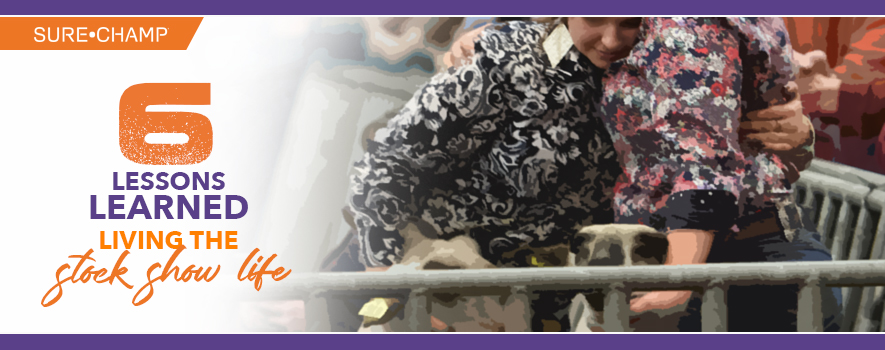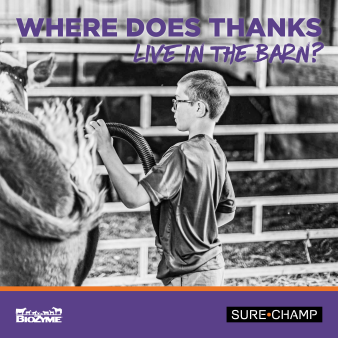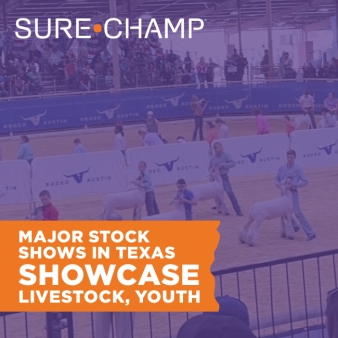
Go through the show box of any young livestock exhibitor and you’ll find an endless collection of supplies that help provide the best care for their animals to maximize their performance in the ring. Skin and hair products, brushes and combs, appetite supplements, feed pans and feed, show stick or whip and a harness, the list goes on. But what about the tools inside that show box that we can’t see? The tools that aren’t necessarily intended for the animal, but instead the intangible things that showing livestock teach and provide to us. While we spend countless hours preparing our livestock to be show-ready, our animals are preparing us for life.
RESPONSIBILITY
One of the greatest lessons working in the barn can teach us is the value of responsibility. When the alarm clock rattles off early every morning, it is up to you to wake up and do chores. There is a living animal relying on you to provide its essential daily care, such as feeding and exercising. And if you want to be successful, the responsibility goes beyond just being a basic care taker. You might need to research what you are putting in the feed pan each day to ensure you are maximizing the nutrition of your animal. You may need to skip that movie night or sleepover to keep working hair in the barn or drive your pig for another lap. Yet as you grow older and reflect, you won’t regret the parties you missed or how tired you were from early mornings and late nights. You’ll just be thankful that the time you spent out in the barn taught you how to take responsibility for your actions and earn success.
COMPETITION AND CHALLENGING YOURSELF
Show ring competition provides an entire range of emotions to anyone who enters the ring. The physical and financial investments are on the line while your emotional investment in how you do might affect your entire day depending on the outcome. However, win or lose, healthy competition is proven to be good for the soul; and there is no competition better than what you will find in the confines of the arena. Showing livestock teaches you how to be an internal competitor with yourself. As you work in the barn each day, you should focus on becoming the best version of yourself or making your animal better than they were yesterday, rather than focus on beating someone else. Unlike sports where you may be born with an innate ability to perform, when it comes to showing livestock, if you can dream it, you can do it. If you set high goals, work extremely hard and have a little bit of luck on your side, your goals are within reach. The competitive mentality of showing livestock teaches you to be competitive in the work force and in life, and always push yourself to become better each day.
LEADERSHIP
Whether out in the barn or in the ring, you are LITERALLY leading or driving an animal around and dictating where they go. Yet, outside of this obvious vernacular, being involved with showing livestock presents emerging opportunities for young people to step up and become a leader. Breed associations and youth organizations provide outlets for young people to lead others and get involved with improving their experiences as they grow in the industry. Learning about the daily care and nutrition of livestock animals teaches young people to learn more about the industry and someday become an advocate if they so choose. And outside of the obvious opportunities, showing livestock constantly promotes the idea of giving back to the industry in the ways it gives to us all.
FINANCIAL SENSE
Money doesn’t just fall from the sky. When you show livestock, you have to learn how to balance a check book, keep track of expenses and what you are investing in and keep current records. This is an incredibly valuable skill that many young people are not taught. Being involved in investing money in your livestock project can lead to more financial stability as you enter the work force and begin a life of your own.
VALUES
Growing up with a solid foundation of values is central to living a good life. As you think about the time spent in the barn or at a show, it is easy to identify the core values you learn. Raising livestock gives you a reason and purpose for waking up every morning. Through hours of preparation, one can learn the true value of hard work and dedicating yourself to your goals. Patience is gained through working with siblings or others involved in the industry and understanding that you can’t bring about change in a day. The one-on-one time caring for livestock teaches each of us to be compassionate for another life other than our own. This compassion stems from a respect we learn to have for animals and an understanding of all the ways they provide for us in all facets of their life. The respect we have for their life influences our decision to provide the highest quality care and means of living. Relationships that we build with both our animals and others helps us to mature and establish connections with others. There’s no question the list of values you learn in the barn may vary slightly, but the common denominator they all share is their essential purpose to bringing structure to life.
PEOPLE
You have more than likely heard someone say the best part of this industry is the people. The relationships formed showing livestock is most likely the greatest asset we will gain. Friendships are forged out of common interests and competition in the ring. Role models quickly surface in your life as individuals invest their time into helping you achieve your goals. Families draw closer together as they work alongside one another every day. The relationships we create with people through showing livestock don’t just last during our time in the ring; those relationships last for life.
Throughout the daily routines that ensue in the barn, it can be easy to just focus on the instantaneous work that has to get done each day. Our animals require a lot of care to perform at the highest level. However, when you look at everything from a big picture, it is obvious that our care comes full circle. We invest a lot of time into our animals, and they reciprocate the same amount of time in the form of life lessons. While we fill their pans and feed bunks up each day, they fill our hearts with memories, values and lessons that will last a lifetime.

